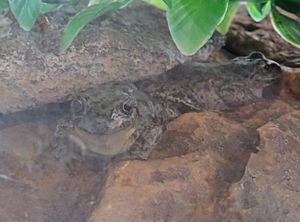Atelognathus patagonicus facts for kids
Quick facts for kids Atelognathus patagonicus |
|
|---|---|
 |
|
| Atelognathus patagonicus in Neuquén, Argentina | |
| Conservation status | |
| Scientific classification |
|
| Kingdom: | Animalia |
| Phylum: | Chordata |
| Class: | Amphibia |
| Order: | Anura |
| Family: | Batrachylidae |
| Genus: | Atelognathus |
| Species: |
A. patagonicus
|
| Binomial name | |
| Atelognathus patagonicus (Gallardo, 1962)
|
|
| Script error: The function "autoWithCaption" does not exist. | |
| Synonyms | |
|
Batrachophrynus patagonicus Gallardo, 1962 |
|
Script error: No such module "Check for conflicting parameters".
The Patagonian frog, officially known as Atelognathus patagonicus, is a special type of frog. It belongs to the Batrachylidae family. This frog is found only in one specific area: the volcanic lands of Neuquén Province in western Argentina.
Where it Lives
The Patagonian frog makes its home in permanent lagoons. These are like small lakes that always have water. The lagoons are usually surrounded by dry grasslands or semi-desert areas. While these frogs mostly live in the water, you can also find them in the plants around the lagoons. They lay their eggs and have their babies in the water.
Why it's in Danger
Sadly, the Patagonian frog is in critical danger. Many things threaten its survival:
- Introduced Fish: In some places, like Laguna Blanca, fish such as perch and salmon were put into the water. These fish ate the frogs or their food, causing the frogs to disappear from that area.
- Water Pollution: Some ponds where the frogs live are facing eutrophication. This means there are too many nutrients in the water, often from pollution. This can harm the water quality and the frogs.
- Diseases: Frogs can also get sick from diseases, which can spread quickly and harm many frogs.
Even though some groups of Patagonian frogs are stable in isolated ponds, they still face risks from new fish being introduced and from diseases. Protecting their homes is very important to help these unique frogs survive.
See also
 In Spanish: Atelognathus patagonicus para niños
In Spanish: Atelognathus patagonicus para niños
 | Ernest Everett Just |
 | Mary Jackson |
 | Emmett Chappelle |
 | Marie Maynard Daly |


